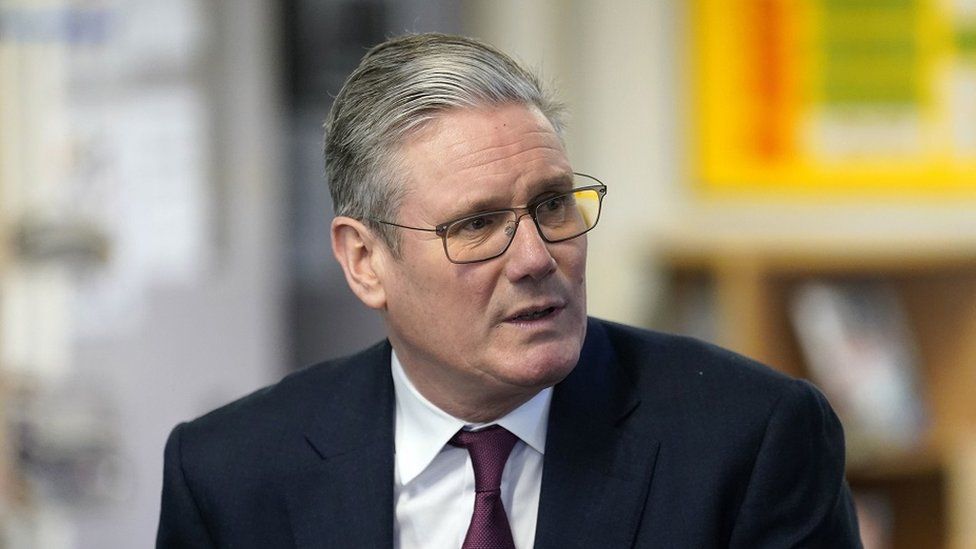ARTICLE AD BOX
 Image source, PA Media
Image source, PA Media
By Henry Zeffman
Chief political correspondent
Confused about whether Labour is still committed to its £28bn green investment pledge?
If so, you're in good company. Asking that question of some of the most senior people in the Labour Party this week elicited responses including: "Honestly, I don't know", and "I can't work it out either".
You might not have been helped if you watched Jonathan Reynolds, the shadow business secretary, being asked that question this morning.
Labour remains "absolutely committed to greater public investment," he told BBC Breakfast.
He could not promise that green investment would reach that "particular level" - managing to avoid even having the number come out of his mouth.
How about Rachel Reeves, the shadow chancellor?
"All policies have to be consistent with our fiscal rules," she told the party's business conference at the Oval cricket ground this morning.
"Twenty-eight" did not pass her lips.
The comments of Mr Reynolds and Ms Reeves appeared to suggest a theme: backing billions of pounds of green investment but letting the £28bn figure fall quietly by the wayside.
Because campaigning at the Kingswood by-election at around the same time Ms Reeves was speaking, Sir Keir Starmer restated the existing policy without any apparent qualms about using the figure.
"We will ramp up to that £28bn during the second half of the parliament… subject to our fiscal rules," the Labour leader said.
Truss mini-budget
The question of whether Labour's £28bn policy is a pledge, an aspiration, a goal or something else entirely is not one of dry semantics.
The money is there to fund Labour's "green prosperity plan", a suite of their most important plans for government, including a vast programme of retrofitting homes with insulation, battery factories, clean steel plants, and a publicly-owned clean power generation company.
Image source, PA Media
Image caption,Energy-efficient homes are key to Labour's plans
Politically, it gets to one of the most important questions about Sir Keir Starmer's Labour Party: if it enters government later this year, how would it balance economic discipline with its ambitions to transform the country?
It is worth remembering that the £28bn policy has changed more than once already.
The plan was first announced in September 2021, when Ms Reeves said a Labour government would invest £28 billion every year in the green economy.
A year later, after the dramatic changes to the economic climate caused by Liz Truss's mini-budget, the target was adjusted such that a Labour government would meet it about halfway through its first term.
And existing government investments will be counted towards the figure, making it more like a pledge of around £18bn of new money.
Worst of both worlds?
More recently another factor has entered play: £28bn has become a repeat element of Conservative attacks on Labour and its leadership.
That figure was mentioned five times at this week's prime minister's questions - each time by Rishi Sunak.
That's what worries Labour strategists who believe that the most important priority for Sir Keir is to demonstrate fiscal restraint, and that as a result he should drop the figure altogether while continuing to promise a significant increase in green investment.
But there are also those who fear that ditching the £28bn would feed a perception among some members of the public that Sir Keir does not stick to his promises.
Perhaps a bigger group in Labour high command is simply desperate for clarity one way or the other.
They fear that at the moment Labour is getting the worst of both worlds: frustrating those who want a Labour government to pursue an ambitious green investment programme, while not getting any credit on this issue from voters who prioritise fiscal caution.
Some believe the current confusion is because the line shadow ministers are straining to express is a holding position.
'Feels unsustainable'
After Chancellor Jeremy Hunt delivers his Budget on 6 March, Labour will have a clearer idea of the pre-election tax and spend status quo.
If the government announces significant tax cuts, for example, Labour may use that as an opportunity to argue they have been forced to abandon the £28bn by the Conservatives' economic recklessness (an argument the Conservatives would of course dispute).
After today's awkwardness on the subject, though, some Labour insiders question whether the present position can hold until the Budget.
"It feels unsustainable," was the frustrated take of one party official this afternoon.
However the issue resolves itself, some Labour insiders are worried about what their handling of the issue says about the party's decision-making.
"Imagine if we get into government and have ten £28bn decisions to make a week," one said.

 11 months ago
79
11 months ago
79








 English (US) ·
English (US) ·